“I don’t hear that magic anymore”: Lynyrd Skynyrd on modern guitar heroes, their love of Gibsons and saying goodbye to fans
Gary Rossington and Rickey Medlocke look back on the Southern rock icons’ remarkable second life, their guitar heroes, and why they have no plans to retire.
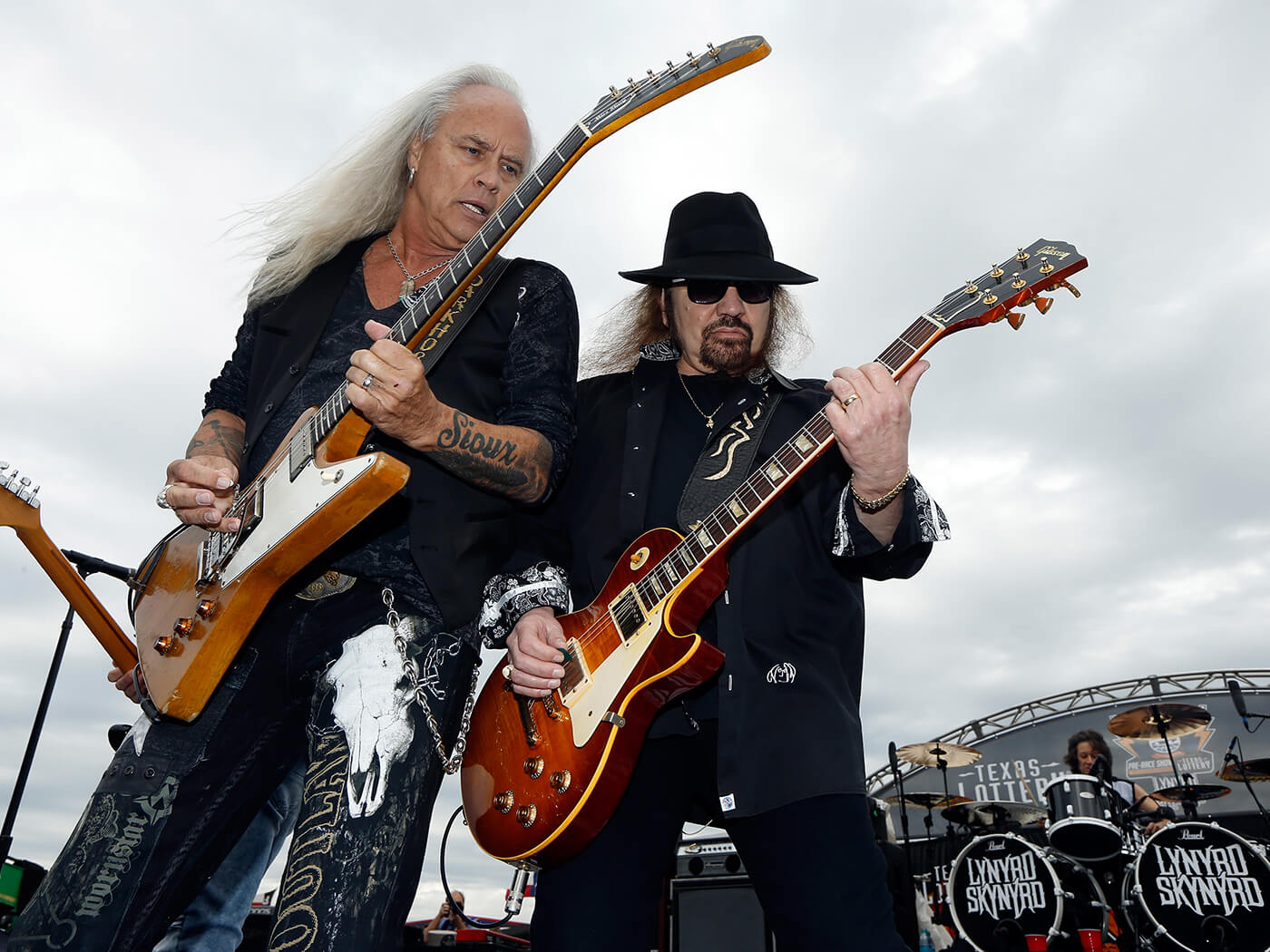
Image: Ron Jenkins / Getty Images
The Lynyrd Skynyrd story is one inevitably tinged by the tragic events of 20 October 1977, when a plane carrying the band crashed, killing six of the 20 people on board, including frontman Ronnie Van Zant, guitarist Steve Gaines and his sister, backing vocalist Cassie Gaines. It was an unthinkable tragedy, and one that robbed the world of a unique and important band that played a huge part in defining the sound of Southern rock, and penning timeless hits including Sweet Home Alabama, and Saturday Night Special and their most beloved and iconic track, Free Bird.
But the Skynyrd story didn’t end on that awful night outside of Gillsburg, Mississippi. In 1987, founding member Gary Rossington teamed up with fellow crash survivors Billy Powell, Leon Wilkeson and Artimus Pyle, plus guitarist Ed King, who had left the band in 1975, and reformed Skynyrd in what was meant to be a one-off tour in tribute to their fallen comrades.
But the reunion has ended up lasting over 30 years, the band going through myriad personnel changes over the decades before finally signing off as a touring band with their in-progress farewell jaunt, having recorded a further nine studio albums in the intervening period.
At the heart of this second life of Lynyrd Skynyrd has been Rossington, the guitarist who has held down his part of the band’s hugely influential three-guitar attack since 1964, sharing it most recently with Rickey Medlocke and Mark ‘Sparky’ Matejka
We meet Rossington and Medlocke during Skynyrd’s as they reach the final jaunt of that final tour. The exuberant 69-year-old Medlocke is as much of a gentleman off the stage as he is a badass on it, kitted out in leather and a sweeping silver mane, his Sioux/Cherokee lineage is highlighted by his tattoos and jewellery. Wearing all black with his ever-present fedora, Rossington possesses the faraway look in his eyes of a man who’s lived one helluva storied past. Humble, reflective and sincere, he does not behave like the living legend he is.
Even as they take their final lap of honour, Skynyrd remain as dedicated to giving the fans the authentic Skynyrd experience as they did when the band first exploded out of Jacksonville all those years ago, still playing each solo and part exactly as they were laid down on record, as Ronnie Van Zandt had insisted on from the earliest days.
“Each player has a distinct role,” explains Rossington of the meticulous division of labour among the band’s three guitar players. “Live, Rickey plays all of Allen [Collin]’s parts, because Rickey grew up with us and was in the very first version of the band as our drummer. He saw how we played from day one. And then Sparky can play anything and is a top-notch picker. He covers Steve’s or Ed [King]’s parts – that faster style on a Strat.”
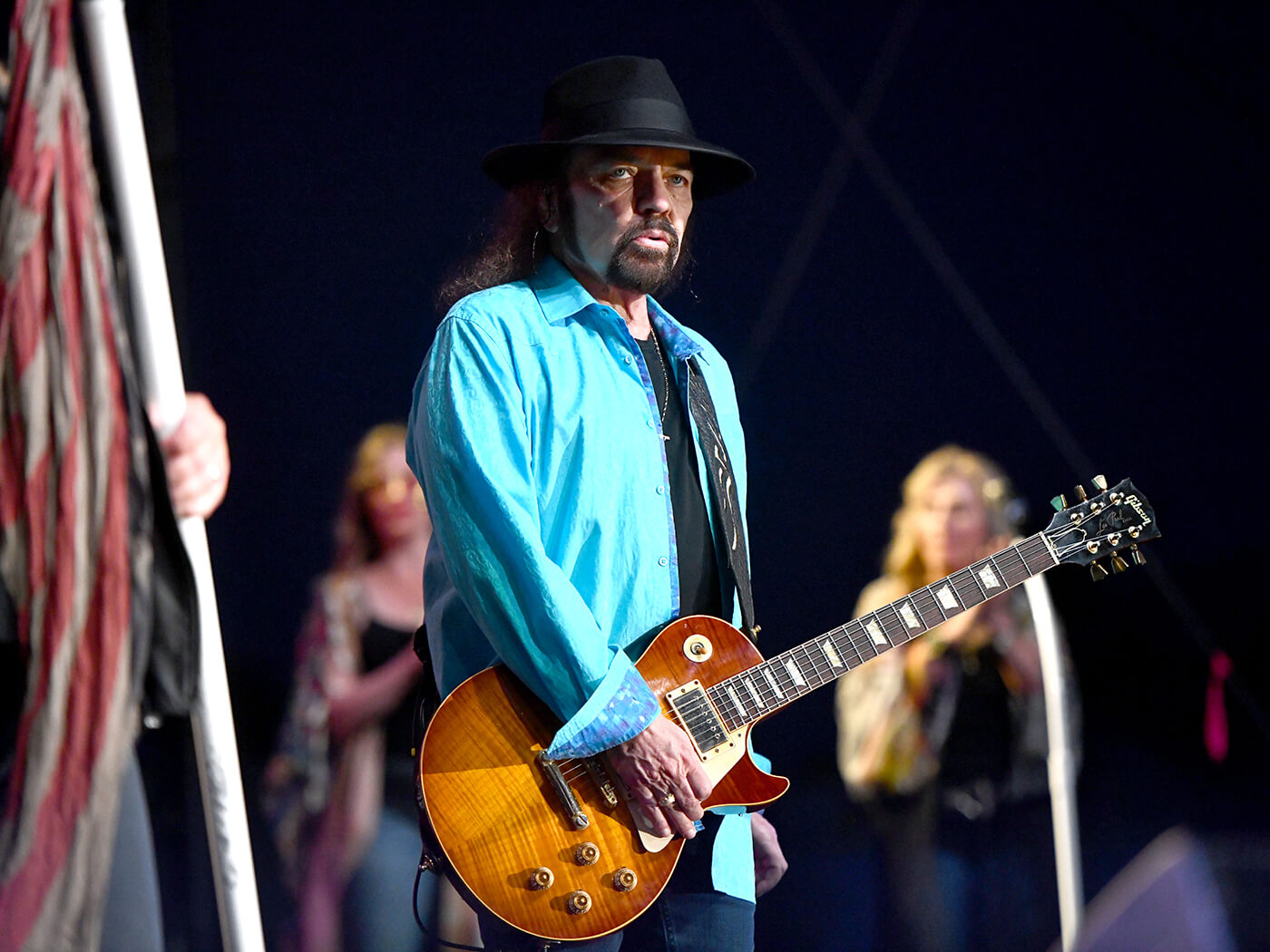
If Sparky offers the Strat shimmer, then Gary and Rickey are Gibson men through and through, with the latter favouring an Explorer and Rossington favouring the most iconic single-cut of them all.
“I always played a Les Paul pretty much,” says Rossington. “We always chose guitars to sound different, so people would know who was playing what. Although me and Rickey play Gibsons most of the time, we still sound unique.”
“My grandad Shorty always played Gibson banjos, mandolins, etc when I was growing up,” explains Medlocke of his professional musician grandfather. “I still have his old J-45. I’ve always loved Gibsons. He played a lot of different instruments incredibly well – five-string banjo, guitar, dobro, fiddle, harmonica and mandolin. He taught me three chords – G, C and D – and then told me to learn the rest on my own. I guess he knew that growing up around all the musicians in his band, I would grasp it pretty quick.”
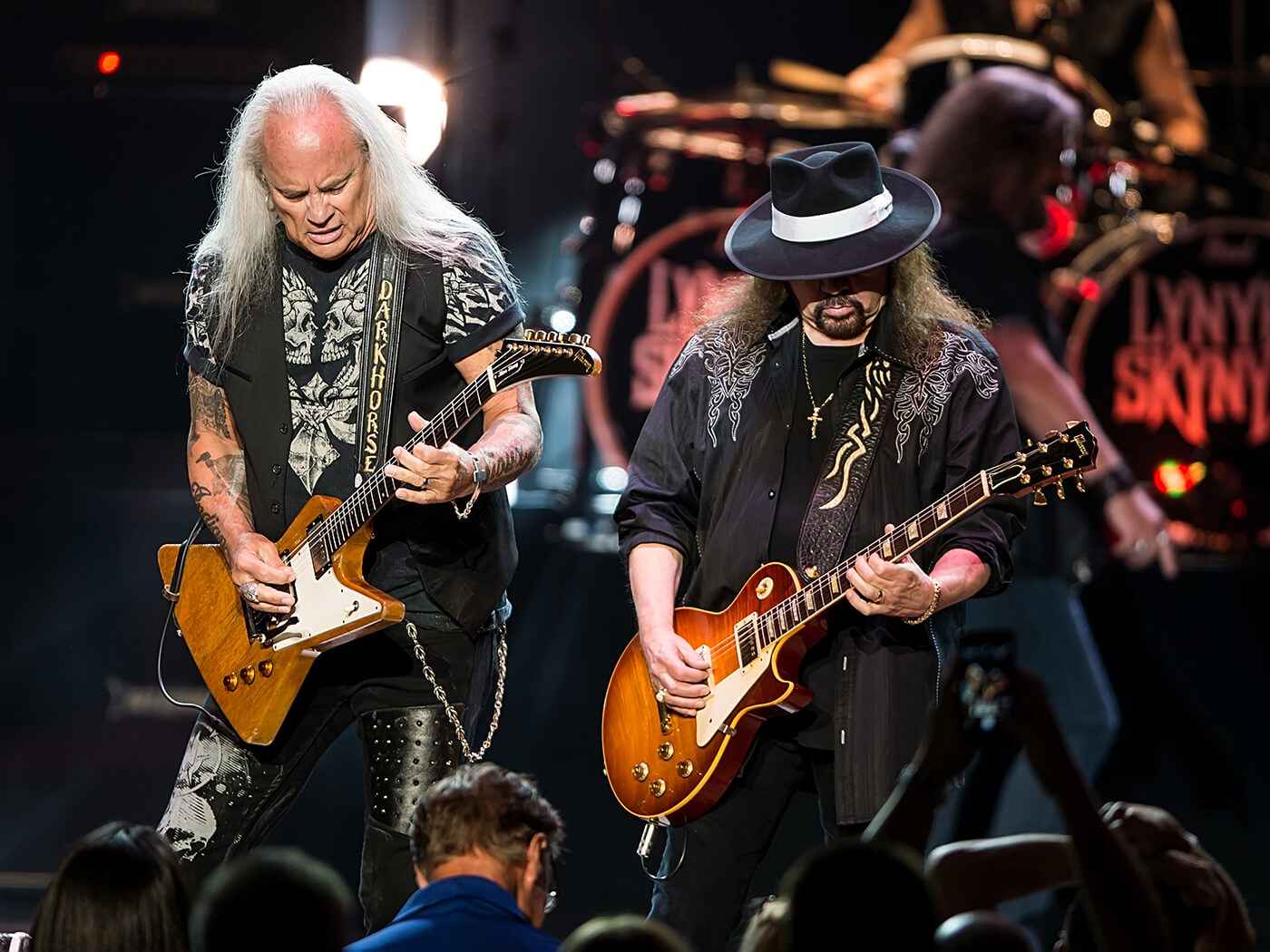
“When we started,” adds Rossington, “We all helped each other improve by jamming often. But my favourite guitar is the Bernice – a ’59 Les Paul. It’s in the Rock & Roll Hall Of Fame now, but man, all the songs I wrote with Skynyrd I wrote on that guitar. I wrote Freebird on it. Same with Rickey’s Firebird which he’d used both live and in the studio lots.
“Our guitars are somewhat sacred to us. In the early 70s, We wanted to get our own sound, our niche. No one could sound like Keith Richards, Page, Clapton. Their instruments speak for them alone.”
“I’ll tell you what I find unique. When you listen to the Skynyrd records from the beginning, when you hear the leads you’d know who it was as the tone and style would suit the song. The three guitarists were identifiable. I loved that about them just as I love the style of those guys and Beck because they are identifiable.”
Dying breed
When it comes to modern guitar heroes, however, both guitarists find that they’re underwhelmed with what they see from the contemporary crop of players.
“We lived through one of the most magical musical times, from the 60s to the early ’80s. But the last guitar hero to emerge was Van Halen,” posits Medlocke .”I don’t hear that magic anymore, sorry folks. Bonamassa is a virtuoso player and I played shows with him when he was 16. But the last guitar hero was really Eddie.”
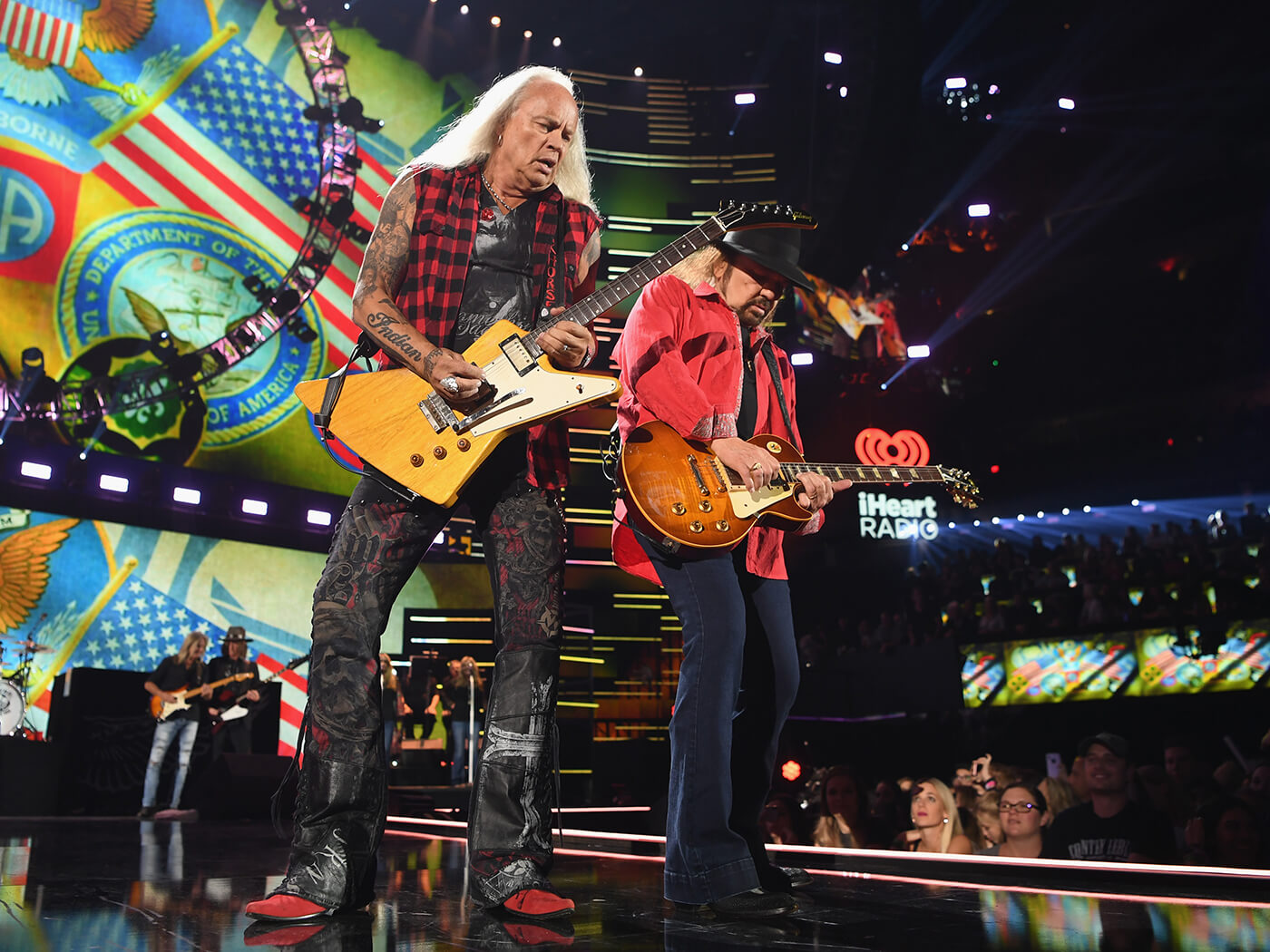
“I concur with Rickey about guitar heroes,” adds Rossington. “Hendrix, Beck, Clapton started that. Then the next generation came out with the odd few, but then it stopped. There are no more coming up I guess times change, people change. I hope one day kids realise that the guitar heroes really played guitars. Paul Kossoff was another hero of mine – he could just touch a note and it was thrilling, his touch and feel were amazing.”
When it comes to guitar influences, another iconic guitarist soon springs to mind for Gary – Duane Allman.
“I think he’s the best on the slide ever,” he affirms. “He’s got his own touch and his own technique. Duane’s touch and feel was everything. I met him a few times and played his Goldtop. He was a big influence on us… and he played a Les Paul!”
Keeping on going
As Skynyrd come towards the end of their long, fruitful reunion, it’s understandable that Rossington’s mind is drawn back to that most significant and terrible night in the band’s history, that fateful night of October ’77.
“I remember most of it, the rapid descent, the screaming, my friends in pain like something out of Vietnam,” he reflects soberly. “Waking up with the plane door on top of me. Cassie and Steve died. They were right next to me and Allen, yet we didn’t die, so we had unanswered questions as to why them and not us? We all believe in God because we’ve been through so much and yet we carried on. The crash has been brought up every day to us, since then. The main thing is we lost our best friends – that’s the hardest part. Our motto when we started was ‘If we don’t make it we’ll die trying.’ And we made it but at a terrible cost.”
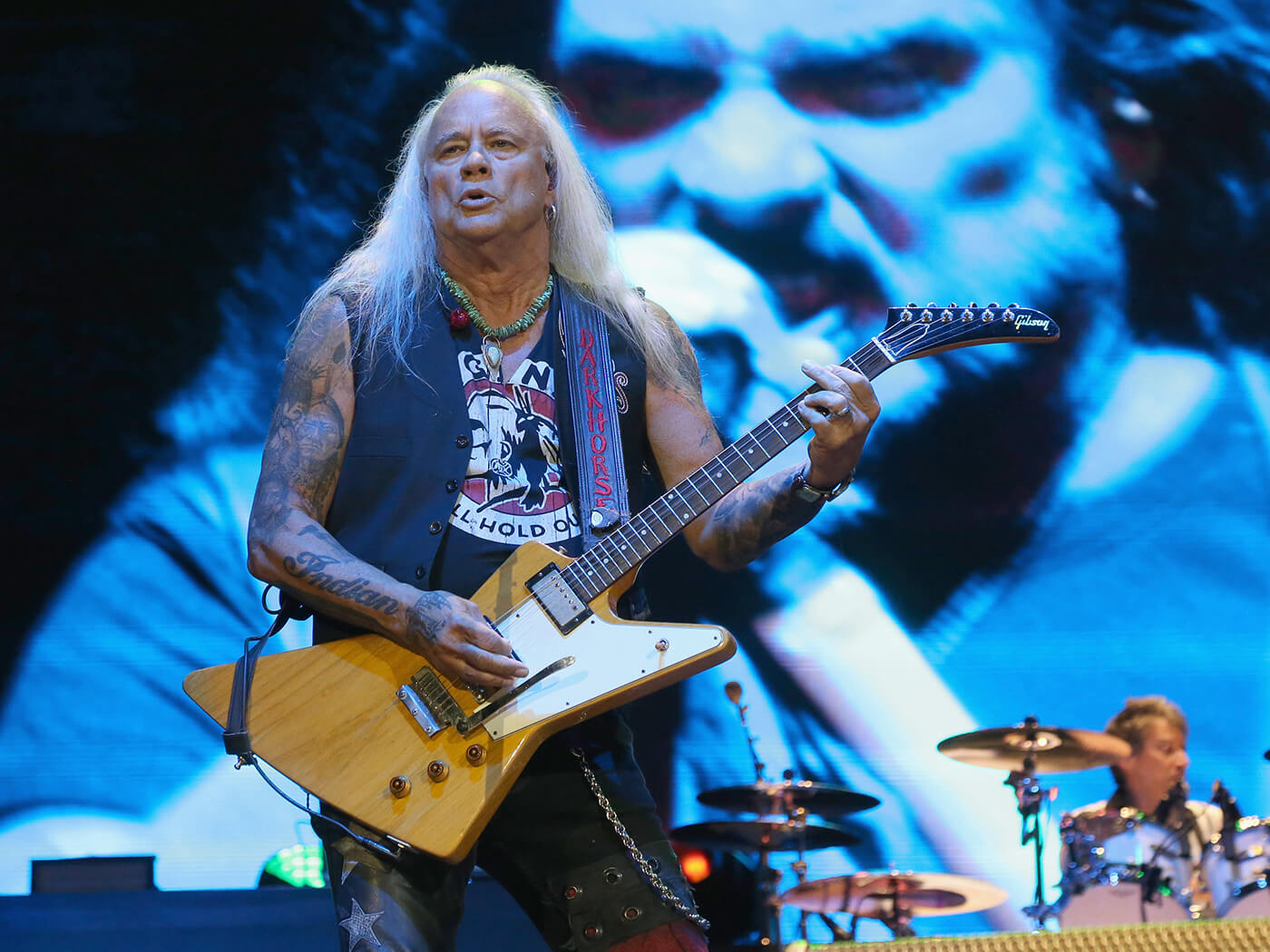
For many, such a traumatic and horrific experience would have signalled the end of our musical journey, but Rossington’s near-superhuman resilience kept him going. And it’s that tenacity is the essence of this unstoppable band. After an arduous recovery, he formed Rossington Collins, before putting Skynyrd back together in 1987.
For Medlocke, who tasted success after he left Skynyrd in 1972 as frontman of Blackfoot, he knew that when he returned to the band in 1996, he knew that he wanted to pay faithful tribute to the parts that Allen Collins (who died in 1990) had originally laid down.
“Gary asked me to learn I’m the One, One More Saturday Night, That Smell and Free Bird… all of Allen’s parts,” recalls Medlocke of his initial reintroduction. “Then he came to Florida and I played him those songs note for note on my Firebird. Gary and Johnny [Van Zandt] said ‘You sure wanna do this as you’ve always been a frontman?’
”But I loved Allen’s great playing and I loved him for what he and Gary created, their parts, how they fit. They’ve always been underrated It was a natural slot for me to come in there as our styles are similar, in a way. When Gary said ‘I don’t have Allen anymore, but you’re the closest thing’, it really touched me. I hope when I cross over to the other side that I meet Allen and he shakes my hand, tells me I’ve done a good job covering for him.”
Second chances
With their time in Skynyrd drawing to a close, it’s understandable that both guitarists are in a reflective mood.
“We are so blessed to have all these chances,” Rossington says. “We had a second chance to do this and we continued. What else is life about than to live it? You’re a fool to not to live your dream. It’s unbelievable people still love our music and come out for us every night. We’re thankful.”
“After all these years, it’s such a historic group, still playing music,” Medlocke adds. “People ask ‘Why keep going?’ I guess we could’ve stopped. But like Merle Haggard said, ‘This is the only thing I know how to do, so I do it’. Gary and I both have other stuff to focus on like our families and hobbies that we look forward to when this is over. But we still want to play music.”
If all this talk sounds like a band ready to knock it on the head, it’s worth noting that Johnny Van Zandt confirmed that a new album is in the works, and Rossington is quick to explain that Skynyrd will continue to play live on occasion – this is just the end of long, demanding tours.
“The farewell tour is to say goodbye to fans, to go out with our boots on,” Rossington explains. “We didn’t want to finish up by playing casinos and fairs, bringing our name down. But I have to slow down a bit as I’ve got heart problems. Rickey’s only got half a lung, yet he’s a wild one on stage…”
“I go a little bit nuts,” Medlocke confesses. “I even broke a whammy bar!”
“I just don’t want to do 80 shows a year anymore,” adds Rossington. “We love our fans. I look at the crowds and songs like Simple Man, Tuesday’s Gone and Free Bird and I see fans crying and singing every word, clutching photos of loved ones who died. There’s so much emotion wrapped up in our music.
“I don’t know how to do anything else play. So we’ll still play occasional dates. Since Ronnie and Steve didn’t live to see the new songs get massive [Street Survivors had just been released prior to the plane crash], they’d never know how big this got and that 40 years later we’d still persevere. We call the stage a miracle zone where all your problems go away up there. Physical pain, your heartache all goes.The professionalism comes out and we blaze away. That’s when music speaks a powerful language.”
“We’d like to continue live shows here and there, especially for our charities,” Medlocke adds. “One of the most magical things for me is when we hit the stage and the looks on people’s faces who can’t believe we’re standing up there! The fans give us so much. We now see four generations in our audiences. The camaraderie and playing between us all is tight.”
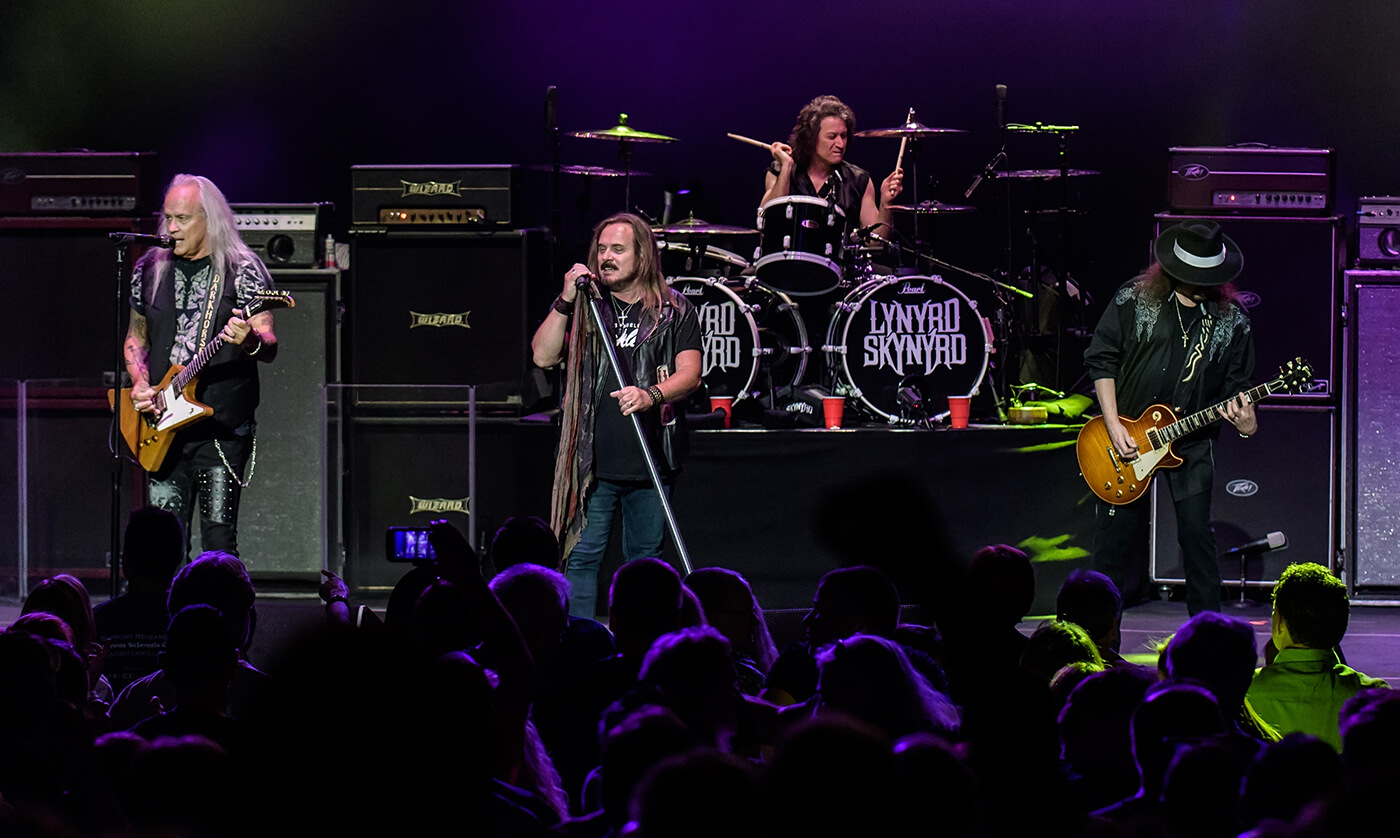
“We’re all great friends,” Rossington agrees. “Rickey and I get off the road but we talk on the phone. We both love fishing and Rickey will send me a photo of something he’s caught…”
“We start to miss each other after a few days when we come off the road,” laughs Medlocke. “I’m just appreciative every day I wake up and feel fortunate being in one of the greatest bands ever. I’m grateful for my band family and my home family. I promised Gary back in ’96 I’d stick with them until the very last note is played.”
“The music lives on. It’s bigger than us,” concludes Rossington. “I know people are gonna miss us and its very emotional for us too.”
Read more artist interviews here.
